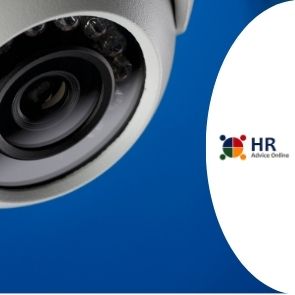Surveillance in the workplace
Surveillance in the workplace is becoming increasingly relevant as it relates to security of information and business operations.
This can present questions for employers and employees regarding what surveillance is or is not appropriate in the work environment. Below we provide some useful points to consider.
Surveillance may take different forms including visual, audial, and technical (phone and computer based).

Also known as Optical Surveillance, this may include all forms of audio-visual and sound monitoring and/or recordings. This can be prohibited in certain workplace environments, including bathrooms, shower rooms, change rooms and designated breast-feeding (lactation) spaces.
Depending on your state or territory, this may also include prayer rooms and sick bays – anywhere where an employee may be vulnerable to being captured undertaking a protected or private activity.
Visual surveillance however may be necessary in certain environments from a safety or security perspective. As an example, using cameras in a retail environment to monitor against theft, or to provide evidence that criminal activity has occurred or been suspected.
Audio surveillance takes the form of creating recordings of conversations which may be held in person, or via phone or online. Sometimes recordings of conversations may be desired to be captured for future use, for example, capturing a training session so that it can be referred to again in the future. In this instance, it is imperative that all participants are aware of and acknowledge that the recording is being made, and consent to any future use of the recording.
Covert audio surveillance is when a conversation is recorded by any means by one or more parties, without the consent of another party. Most states and territories prohibit the recording of covert conversations.
Covert recordings made in the workplace are often inadmissible as evidence in workplace disputes, particularly where only one party is aware that the recording is being made, there is a potential for them to have moderated or manipulated their own communication towards a desired outcome or conversation. Further to this, covert recordings have the potential to become problematic for the person(s) responsible for disclosing the recording if it is deemed to be captured illegally, or if it violates privacy laws or company policies. This creates a risk of resulting in a counter claim if there is a workplace dispute.
The remote and/or hybrid working environment has increased the desire from some employers to undertake surveillance in this area.
This type of surveillance may include monitoring output via emails being sent, phone records, records of keystrokes, contribution to documentation and even participation via online chats. Productivity measured only this way, without respect to an overall and more holistic measure of performance, can have the potential to become problematic.
To alleviate business risk and potential claims, it is recommended that any, and all workplace surveillance via any means, is articulated, acknowledged, and consented to in your workplace and supported by an appropriate and up to date policy.
In considering the use of surveillance in your workplace what is appropriate (and lawful) may depend upon any applicable Award or Agreement, the employee’s roles, and the nature of your business, including the reasons for, and purpose of undertaking surveillance.
How can HR Advice Online support my business?
Are your policies and agreements up to date, or do you require support or assistance with implementing them across your organisation? HR Advice Online can support and guide you through this process. For assistance with any HR matters, please contact us at [email protected] or 1300 720 004.




